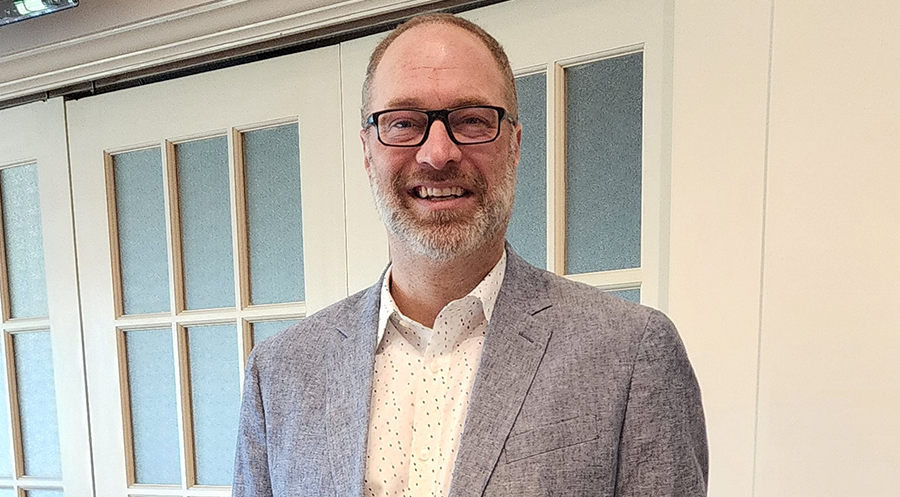Meet Leighton
“Working in the military, you get to a breaking point from time to time, and so I had taken up hockey to get my mind in check. I told people how much it was helping, and then on January 10th, 2016, I had my heart attack at 38 years old.”
Before Leighton’s heart attack, he worked as an Avionics Junior Supervisor with the Royal Canadian Air Force in Greenwood, Nova Scotia – a small town home to the largest military base in Atlantic Canada. He had quit smoking the year before and taken up hockey to increase his physical activity and to destress.
Despite an ongoing, dry, non-productive cough that had developed a few months before his cardiac event, he was feeling good.
“The day of my heart attack, I was changing the winter tires on my car, which was a decent amount of work. When I was done, I had a shower and sat on the couch to watch a show and rest. I kept trying to put my arms back behind my head but was getting this weird numb feeling and couldn’t relax. Then it felt like somebody was jamming their knee into my chest, but it wasn’t like that sudden grab of my left arm. I got up and went and took an ibuprofen, and I realized when I went to the kitchen I was getting very dizzy.”
All military members must complete First Aid training every three years, so access to emergency information was only an arm’s reach away.
“I always keep the latest First Aid handbook, and I always knew exactly where it was in the house. I looked up cardiac arrest symptoms and was saying yes (in my head) to them all. In response, my partner at the time drove me to the hospital about 20 mins away in Kentville. They did a heart ultrasound and said, ‘Nope, not the heart.’ Nonetheless, they wanted to keep me overnight, but I decided to head home and sleep in my own bed, and I went back up the next morning. They did more blood work, and my troponins (a type of protein found in the heart’s muscle with high levels typically indicating a heart attack has occurred) were elevated.”
Healthcare professionals advised Leighton that they needed to send him for an angiogram in Halifax but that the quickest way to receive this procedure was as an inpatient. Otherwise, it would take six months as an outpatient. Due to this, his stay in the hospital lasted about a week.
“It was great because I got my bloodwork done all the time and felt okay.
In the military, if a troop is in the hospital for some time, the Commanding Officer of the squadron or a delegate will visit the person in the hospital. It probably seemed funny because they didn’t know why I was in the hospital, and I didn’t look any different, and I was up and joking – they were probably like, ‘Why are you here?’.
They eventually sent me to Queen Elizabeth II Health Sciences Centre (QEII) for the angiogram. I had a 70% blockage in the left anterior descending artery (LAD) and 20 – 50% everywhere else. The cardiologist let me know that they were putting in a stent. During the procedure, I asked if I could still play hockey because I had an extensive budgeting hockey career in the military. She said we’ll discuss that later. But the coolest part was that nagging cough that I had all those months broke up that night, and in eight hours, the cough was disappearing.”
A few weeks later, Leighton began his cardiac rehab program. Unique to those in the military and unfortunately unlike the experiences of many civilian Canadians recovering from a cardiac procedure, Leighton was afforded the time to complete the program during work hours and was reimbursed by the military for gas and other expenses.
“In the military, people get a little extra to ensure they don’t let them fall through the cracks – it’s the benefit of time. Knowing that if something happened, at least job-wise, there’s somebody there to take over, and you can leave work to go to your appointment. It’s nice not to worry about an hourly wage lost or taking a day off to attend a medical appointment. I know there are other’s saying, ‘How am I gonna pay for this?”. Or, ‘Why would I go to the heart rehab program because I have to take a day off and nobody’s reimbursing me?’.”
With the benefit of time, Leighton feels a big difference today.
“I worked 12 years of shift work in a very high-tempo environment. I didn’t have the best relationships, or they just didn’t turn out. Combined with what I was eating, smoking, and drinking. Then, I had this definitive moment where I faced some mortality, and now I look at my life in chunks of time – before and after. Now I feel like I got this work done, and I got a bit of extra time.”
Unfortunately, Leighton’s heart condition impacted his status in the military.
“The outcome of my cardiac event kind of forced the squadron’s hand. Every person in the military has to meet the universality of service and essentially be able to go to war if needed. Can you be a soldier first? For example, say you have a condition that affects your blood or are on a blood thinner. If you go to war and get hurt and require all the blood in the hospital, you’re taking it away from other soldiers – you’re a liability.
They don’t just kick you out, though. The military helps ensure you have a proper transition into civilian life. I applied for extensions and got about five extra years after my event. I did 20 years to the day, and before I got out, I went back down to the floor and was at the top and retired in the rank of Sergeant.
The differences today are broad because I feel physically better, but the mental game is the biggest. It’s always in the back of my mind, and I consider what I put into my body or if I’m not getting up and going for a walk that day. It’s always a question of how close was I or how much time did I have? You can change physically, but there’s also a mental change. But I’m glad it happened, kind of, it’s weird.”



